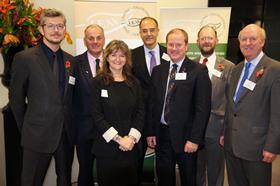
Experts from across the food and farming sector have urged farmers to realise the economic benefits of sustainable farming.
Speaking at LEAF’s annual event, Charles Cowap, from Harper Adams University, said farmers need to create and embrace new markets such as payment for ecosystem services, biodiversity offsetting, carbon and conservation covenants.
“The role that farmers can play in delivering ecosystems services is increasingly important,” he added.
LEAF chief executive Caroline Drummond said that it's crucial the industry is flexible and open to new ideas and opportunities.
She said: “While the future certainly presents its challenges, what our speakers have shown is that there are significant opportunities as well. Farmers need to understand and maximise the economic benefits of the huge variety of public goods they deliver.”
HSBC’s head of agriculture, Allan Wilkinson, said that agriculture now has the biggest economic opportunity. He believes few farms are operating at their optimum performance, and farming needs to get closer to the 'end customer'.
Keynote speaker Gregor Henderson, from Public Health England, said that farmers are key players in health promotion through farm visits, open days and community engagement. He stressed that this approach can deliver benefits for farmers and the wider community.
The event, held yesterday, highlighted how farmers can maximise sustainability through economic performance, environmental quality and social health to drive their businesses forward. The conference was entitled ‘Sustainable Agriculture: Show me the money’.
It finished with a debate hosted by Countryfile presenter and journalist, Tom Heap, with closing words by The Rt Hon Michael Jack, food and agriculture advisor to HSBC.
The event follows a new UN report published this week, which said that agriculture is responsible for 11 per cent of global greenhouse gas emissions. The report said that no-tillage practices and agroforestry could lower emissions produced by farming.
LEAF (Linking Environment And Farming) helps deliver sustainable food and farming by working withfarmers, the food industry, scientists and consumers.



